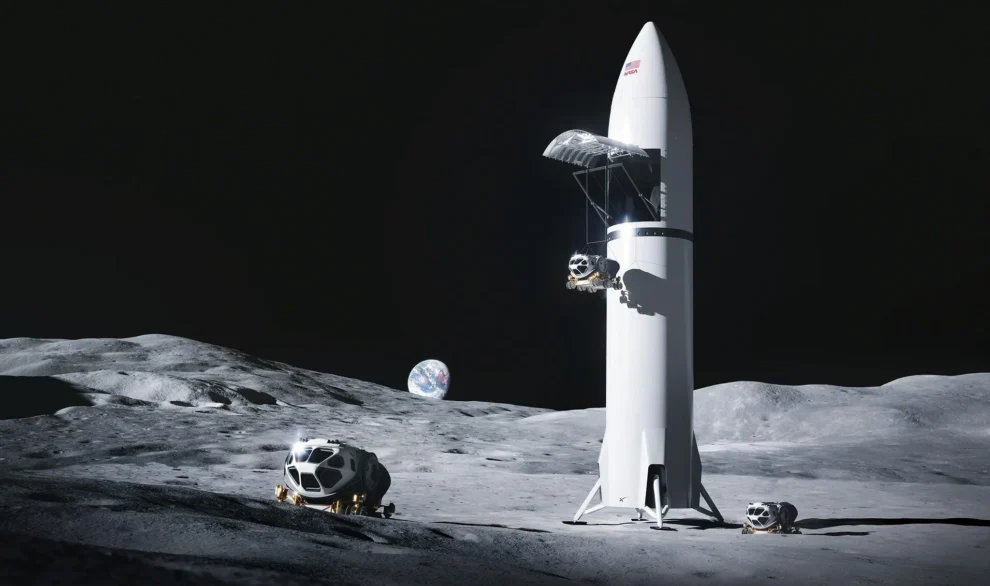NASA is taking a significant step forward in its ambitious Artemis program by enlisting the help of commercial space giants SpaceX and Blue Origin. In a move that underscores the growing role of private companies in space exploration, NASA has tasked these industry leaders with developing lunar cargo landers capable of delivering substantial payloads to the Moon’s surface. This initiative marks a critical phase in humanity’s return to the Moon, paving the way for sustained lunar exploration and potential future missions to Mars.
This isn’t the first time NASA has collaborated with SpaceX and Blue Origin on the Artemis program. Both companies are already developing human landing systems for upcoming Artemis missions – SpaceX for Artemis III and Blue Origin for Artemis V. However, this new contract signifies an expansion of their roles, requiring them to adapt their existing lander designs to accommodate heavy cargo deliveries.
What will they deliver?
- SpaceX: NASA has slated SpaceX’s Starship cargo lander to deliver a pressurized rover, currently being developed by the Japan Aerospace Exploration Agency (JAXA), to the lunar surface. This rover will be crucial for conducting scientific research and exploring the lunar terrain.
- Blue Origin: Blue Origin’s Blue Moon lander will be responsible for transporting a lunar surface habitat, providing shelter and life support systems for astronauts during extended lunar missions.
These cargo deliveries are planned for no earlier than 2032 for SpaceX and 2033 for Blue Origin, aligning with the timeline of Artemis VII and subsequent missions. The landers will need to be capable of delivering a substantial payload – approximately 12,000-15,000kg – to support the growing needs of the lunar outpost.
Why is this a big deal?
This collaboration between NASA and commercial partners signifies a new era in space exploration. By leveraging the innovation and efficiency of private companies like SpaceX and Blue Origin, NASA can accelerate its lunar exploration efforts and focus on its core competencies while relying on commercial partners for transportation and logistics.
This approach not only reduces costs but also fosters a competitive environment that drives innovation and technological advancements. Furthermore, it opens up opportunities for commercial activities on the Moon, potentially leading to lunar resource utilization and the development of a lunar economy.
Challenges and Opportunities
While the prospect of lunar cargo deliveries is exciting, it’s not without challenges. Developing landers capable of carrying and safely landing heavy payloads on the Moon’s surface is a complex engineering feat. Ensuring the reliability and safety of these missions will be paramount.
However, the potential rewards are immense. Successful cargo deliveries will be crucial for establishing a sustainable lunar base, enabling long-duration missions, and ultimately paving the way for human exploration of Mars. The knowledge gained from these lunar endeavors will be invaluable for future deep-space missions.
My Perspective
Having closely followed the space industry for years, I’m genuinely thrilled about this development. The collaboration between NASA and commercial partners like SpaceX and Blue Origin has already yielded remarkable results, and this new venture promises to push the boundaries of space exploration even further.
I recall the excitement surrounding SpaceX’s Falcon Heavy launch and the successful landing of its boosters. It was a pivotal moment that demonstrated the capabilities of private space companies. Now, with these lunar cargo missions on the horizon, we are witnessing another giant leap forward in our quest to explore the cosmos.
Looking Ahead
As NASA and its commercial partners embark on this exciting journey, the world will be watching with anticipation. The success of these lunar cargo missions will not only advance our scientific understanding of the Moon but also inspire future generations to reach for the stars.
This is a testament to human ingenuity and our relentless pursuit of knowledge and exploration. The Moon, once a distant dream, is now becoming a tangible destination, and these cargo missions are laying the foundation for a future where humanity has a permanent foothold in space.
NASA’s decision to entrust SpaceX and Blue Origin with lunar cargo deliveries is a strategic move that accelerates the Artemis program and ushers in a new era of commercial space exploration. By combining NASA’s expertise with the innovation of private companies, we are closer than ever to establishing a sustainable presence on the Moon and venturing further into the depths of space. This is an exciting time for space enthusiasts and a testament to the boundless potential of human collaboration and exploration.



















Add Comment